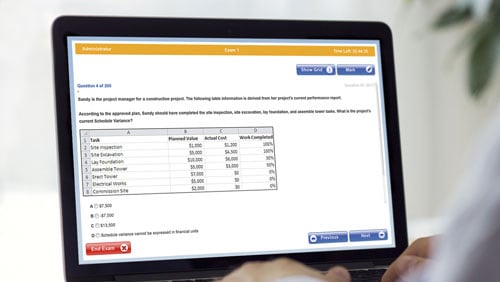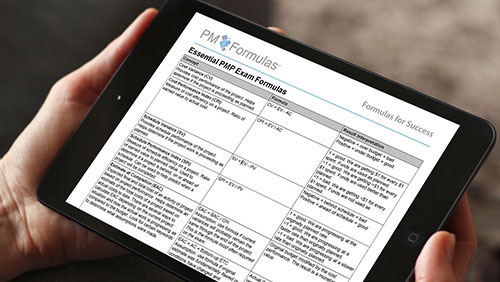Help! I’ve Failed The PMP® Audit!
 Recently we’ve seen a trend: The Project Management Institute (PMI)® appears to be doing more Project Management Professional (PMP)® audits. That’s where they review your application in detail before approving you to take the PMP® Exam.
Recently we’ve seen a trend: The Project Management Institute (PMI)® appears to be doing more Project Management Professional (PMP)® audits. That’s where they review your application in detail before approving you to take the PMP® Exam.
But there’s another part to this trend: we are seeing more people failing audits and reaching out for help. If that’s you, don’t worry: I’ve got you covered with this article. And if you are in the middle of your PMP training and preparing your application right now, read on: I have some great tips to help you avoid the headaches audits can bring.
Why PMI® Does Audits
First, you should know that being selected for an audit is random. There’s nothing on your application that flagged it as being worthy of a second look. PMI does, however, reserve the right to audit any candidate at any time – that’s clear in the PMP Handbook.
PMI does audits to ensure the standing of the PMP credential. The application team wants to make sure that their policies are fair and that they are only moving people to the next stage of the process who are eligible for the credential.
In other words, audits protect you because they ensure the value of the PMP credential stays high. As PMI can’t subject every application to an audit, they select a proportion to review.
The Audit Ensures That You Are a Project Manager who Leads & Directs Projects
One reason that the PMP credential has such a high regard around the world is the fact that it is reserved for a very particular group of people: project managers who lead and direct projects. And the audit ensures that you - the applicant - meet this qualification. So let’s make sure of that:
- You are a project manager if you are the person who has been assigned to lead the project team responsible for achieving the project objectives.
- You are leading and directing if you are ultimately responsible for the tasks as well as have the knowledge and skills specified in the PMP Examination Content Outline.
- And finally it is only considered a project if it is a temporary effort (with a clear beginning and end) undertaken to create a unique product, service or result.
If you or the work you are responsible for do not meet all of these criteria then you should not apply for the exam.
Where the PMP Audit Fits Into the Application Process
If you are selected for a PMP audit you’ll find out by email after your payment has been processed.
You’ll have 90 days to provide the information that the audit team needs. Once you’re successfully out the other side of the audit, your one-year examination eligibility period starts.
How You Can Fail The PMI Audit
There are 3 ways that your application could result in an audit failure:
1. No Fault
This is where the audit team can’t verify your education or experience – you either don’t have the experience or education required or it isn’t clearly enough described in your application.
2. Non-Compliance
This is the outcome if you choose not to go through with the audit process at all. If you don’t respond to the audit you’ll receive a one year suspension period before you can apply again.
3. Fraud
If PMI identify that you have provided false information on your application then you will be permanently suspended from taking any PMI exams. Forever.
Top Reasons For Failing The Audit (And How To Avoid Them)
So what could result in your application failing the audit process? Here are some of the top reasons we have gleaned from students and what you can do to avoid them happening to you.
Your experience entries do not meet the requirements of the PMP credential
The work experience you’ve listed is not aligned with the project management process areas (initiating, planning, executing, monitoring and controlling and closing). It might not be possible for PMI to see what role you took on the project. They need to see that you lead and directed the project.
They also need evidence that you have experience in each of the process areas. You don’t have to show experience in every area for every project but the totality of your application should document that you have experience that stretches across the whole of the Exam Content Outline.
Considerations:
- Make sure your application covers all process areas.
- Use PMI terminology to describe what you did and the tools and techniques you used.
- Try to show your experience across different knowledge areas.
- Focus on what was most important for each project.
- Talk about what you did and how you did it, not what you were responsible for. Describe your contribution in concrete terms.
You’ve submitted experience that wasn’t on projects
PMI doesn’t care about the work you do outside of projects. If you are not clear enough to determine whether they are truly projects, PMI may deem that experience inadmissible.
Considerations:
- Write clear descriptions for your projects.
- Describe the project objective in a sentence.
- Summarize project deliverables by process area (for example, state the project management documents you were personally responsible for in each process)
- Add a single sentence to describe the outcome.
You’ve grouped information about multiple projects
PMI wants to review what you did on each individual project and your application will be rejected if you group information about multiple projects.
Considerations:
- Do not combine your small projects into one.
- List each project separately.
You included voluntary projects
While working on projects unpaid can give you considerable experience, for the PMP® application PMI only wants to see projects that “represent professional and compensated work.” If you include voluntary work this could cause you to fail.
Considerations:
- Only include projects that you were compensated for.
You didn’t submit all the required audit information in one go
PMI requires that you send all your audit information back in one bundle. If they receive an incomplete submission from you, that’s an automatic fail.
Considerations:
- Making sure you have everything required before you respond to the audit.
Boost Your Chances of Success
Going through an audit isn’t the end of the world. If your application is solid, the audit process doesn’t take long and you can start preparing for your exam. If you want to avoid the extra steps and stress that an audit might bring, it helps to have an experienced PMP coach review your application. This can give you confidence and ensure that your investment in your application has the best possible chance of success.
You might also choose to use a PMP coach if you’re preparing a new application after failing an audit. They can help you select appropriate, different projects that are new for PMI’s review: the audit team may not pass projects that previously failed.
If you’ve been audited once you should expect to be audited on your next application. It might not happen: but it’s highly possible. Using the tips in this article you’ll be well prepared in case that happens.


